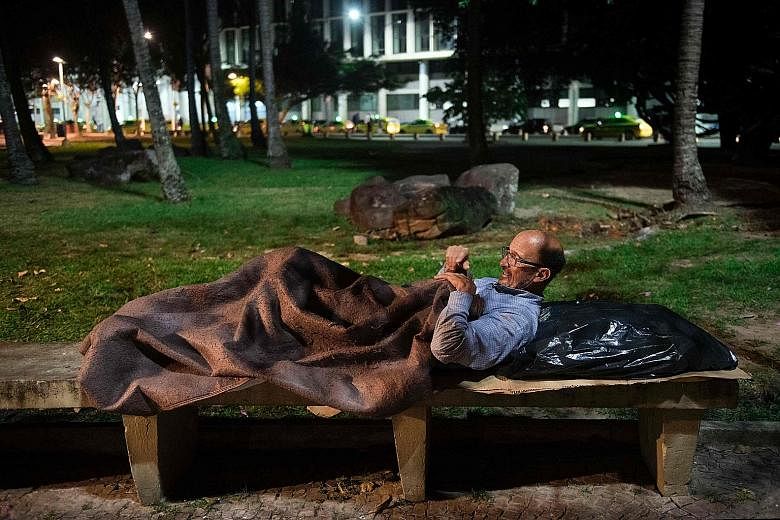RIO DE JANEIRO • Mr Vilmar Mendonca used to be a human resources director for several companies in Brazil. Now he is homeless, sleeping outdoors along with thousands of other victims of the country's economic crisis.
Mr Mendonca lost his job in 2015 and, for a while, lived off his savings. But now, at 58, he sleeps on a bench outside Santos Dumont Airport in Rio de Janeiro.
He leaves some of his stuff at a bank where he is a client, cleans up in public restrooms and lives off food handed out by charity organisations. "It is a terrible situation but I have no choice," said Mr Mendonca, who is divorced and has no children, while looking at job offers on his laptop using the airport's Wi-Fi.
Late last year, the Rio city hall said there were 14,279 people living on the streets - triple the number in 2013.
Dozens of them have advanced degrees, including Mr Mendonca, who studied business administration in Sao Paulo.
His plight reflects the sting of a recession that has taken Brazil's jobless ranks up to 13.5 million people and tarnished Rio, a city that, just a year ago, hosted the Summer Olympic Games.
The homeless population is an especially common sight in Rio's most popular tourist areas, including Copacabana and Ipanema.
In the Old Quarter, groups of up to 20 homeless people take up entire streets every night, sleeping on cardboard and wrapped in blankets.
Among their ranks is a mix of people from street vendors to retired civil servants like Mr Gilson Alves.
Mr Alves, 69, worked for 35 years as an X-ray technician in Rio's public hospitals.
But his pension payments were late and he ended up selling his belongings and giving up his rented apartment.
Two months ago, he ended up on the streets and the bag containing everything he owned was stolen.
He was taken in by social services and transferred to one of the city's 64 shelters, which have room for 2,200 people.
"I feel sad, humiliated and struck down for having put in so many years and then being here because of this government," said Mr Alves, who shares a room with six people around his age.
Rio's social aid secretary Teresa Bergher said: "The situation is critical."
Many Brazilians came to Rio looking for work when the city hosted the World Cup in 2014 and the Olympics last year. But today, oil-producing Rio state's coffers are empty, hit by corruption, low crude oil prices and the Olympic bill.
Former state governor Sergio Cabral, whose 2007 to 2014 administration was crucial to the preparation for the World Cup and Olympics, was convicted of embezzling millions of dollars and sentenced to 14 years in prison.
Part of the money recovered from him was used to pay back wages to 150,000 retired civil servants. But the accounts are still in the red and help for the most vulnerable is insufficient.
AGENCE FRANCE-PRESSE

